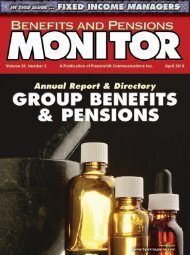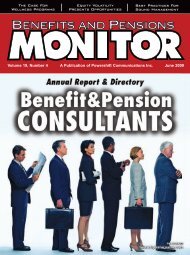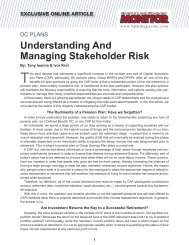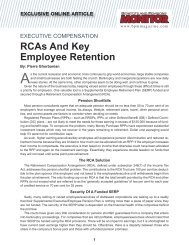BPM October 2010.indd - Benefits and Pensions Monitor
BPM October 2010.indd - Benefits and Pensions Monitor
BPM October 2010.indd - Benefits and Pensions Monitor
Create successful ePaper yourself
Turn your PDF publications into a flip-book with our unique Google optimized e-Paper software.
Figure 3:<br />
tion in political stability, economic performance,<br />
openness to foreign investors, corporate<br />
governance practices, <strong>and</strong> exposure<br />
to exchange-rate risk.<br />
One common thread, however, does<br />
emerge. A number of frontier countries have<br />
a strong correlation to the price of commodities.<br />
This is especially high in the Gulf, African,<br />
<strong>and</strong> Latin American regions. Indeed,<br />
we have seen many oil-producing countries<br />
fi scal <strong>and</strong> current accounts turn positive as<br />
a result of rising commodity prices. Therefore,<br />
the outlook for commodity prices is an<br />
important factor that investors should consider<br />
when approaching investment.<br />
Bottom-up Research Critical<br />
Frontier markets also operate in a much<br />
less effi cient space in terms of analytical<br />
coverage. This lack of broad research coverage<br />
can often lead to price anomalies. Within<br />
each region, there can be quite polarized<br />
underlying returns. As such, there is a pressing<br />
need for active management. The ability<br />
to conduct in-depth research <strong>and</strong> identify<br />
high-quality companies with low-leverage,<br />
cycle-tested management teams is imperative<br />
to any investment approach. However,<br />
this requires suffi cient resources <strong>and</strong> a<br />
research platform that can effectively synthesize<br />
industry <strong>and</strong> stock-specifi c analysis.<br />
Approaching investment can be tackled<br />
in a number of ways <strong>and</strong> it is sensible for<br />
potential investors to investigate their existing<br />
global, emerging, or regional managers<br />
to ascertain what capabilities they have in<br />
this area <strong>and</strong> to ascertain whether they need<br />
to augment their exposure.<br />
However, it is important that any man-<br />
<strong>Benefits</strong> <strong>and</strong> <strong>Pensions</strong> <strong>Monitor</strong> – <strong>October</strong> 2010<br />
2010 Annual Report & Directory<br />
Frontier Markets Are Underleveraged<br />
Source: Bank of America Merrill Lynch (MSCI classifi cations). Data as of 31 December 2008.<br />
ager who invests in frontier countries has<br />
the resources <strong>and</strong> ability to delve deeper into<br />
the opportunity set. Importantly, regardless<br />
of how one accesses frontier markets, their<br />
investment potential is apparent. Yet, there<br />
are risks associated with investment <strong>and</strong>,<br />
on an individual basis, some countries will<br />
continue to remain high risk. Therefore, the<br />
evergreen theme of bottom-up fundamental<br />
research is imperative to underst<strong>and</strong>ing<br />
both the opportunities <strong>and</strong> risks associated<br />
with this nascent asset class.<br />
Potential Risk Factors<br />
Frontier markets exhibit higher risks<br />
than other countries, with varying levels<br />
of liquidity, valuations, <strong>and</strong> corporate governance.<br />
Even the most stable of countries<br />
still faces the natural vulnerability that<br />
comes with being a small, open economy<br />
subject to the whims of fi nancial markets<br />
<strong>and</strong> global economic trends. The events in<br />
Dubai last year make this all too clear. As a<br />
result, it is important to manage these risks<br />
appropriately by maintaining a broad exposure<br />
across the investment universe. Liquidity<br />
is also much lower than in emerging <strong>and</strong><br />
developed markets, while regulatory frameworks<br />
are still in an early state of evolution.<br />
There is limited history of public ownership<br />
of corporations in most of these markets<br />
<strong>and</strong> many frontier market fi rms have been<br />
slow to improve transparency <strong>and</strong> communications<br />
with investors.<br />
Another factor to consider when investing<br />
is the political backdrop. Encouragingly,<br />
we have seen greater political stability<br />
in recent years, particularly in Africa, but<br />
there still remain problems on an individual<br />
Figure 4:<br />
Full Market Capitalization<br />
As % Of GDP<br />
basis. Therefore, an allocation to frontier<br />
markets deserves serious thought. Investors<br />
in the asset class are strongly advised to set<br />
long-term goals for investment <strong>and</strong>, overall,<br />
need to be comfortable in accepting a generally<br />
higher degree of risk-tolerance.<br />
As the emerging markets of today eventually<br />
progress to become part of the developed<br />
world, investors will begin looking for<br />
the next emerging story. While available<br />
information is often sparse, local regulations<br />
are varied <strong>and</strong> complex <strong>and</strong> research coverage<br />
by analysts <strong>and</strong> brokerage fi rms is limited.<br />
However, these were also obstacles that<br />
emerging markets encountered 20 years ago.<br />
Challenges such as these create opportunities<br />
for investors to uncover neglected companies<br />
with healthy or improving operations<br />
<strong>and</strong> to identify stocks that have been ignored<br />
by the mainstream investment community.<br />
How to gain exposure to frontier markets<br />
is up for debate <strong>and</strong> investors should question<br />
how deep down the opportunity set managers<br />
or plans explore. There are also higher<br />
risks associated with investment <strong>and</strong>, therefore,<br />
active management is crucial. Importantly,<br />
the long-term fundamental reasons for<br />
investing remain largely intact <strong>and</strong> with the<br />
fl exibility of a broad range of investments<br />
across a large opportunity set, the asset class<br />
does offer opportunities for the experienced<br />
investor to generate alpha. ■<br />
Nick Beecroft is a portfolio<br />
specialist at T. Rowe Price<br />
Associates, Inc. (wendy_<br />
brodkin@troweprice.com)<br />
1. Free fl oat adjusted market cap in millions<br />
as at November 30, 2009<br />
41









